 Few things are more thrilling, in my passion for actressing at the edges, than those performances that at first seem negligible side characters but who quietly emerge as absolutely essential to the workings of a film. Of course, those theatre-trained actresses are the best at this, witness the work of...
Few things are more thrilling, in my passion for actressing at the edges, than those performances that at first seem negligible side characters but who quietly emerge as absolutely essential to the workings of a film. Of course, those theatre-trained actresses are the best at this, witness the work of...approximately 16 minutes and 37 seconds
15 scenes
roughly 14% of film's total running time
15 scenes
roughly 14% of film's total running time
Margaret Leighton plays Mrs. Maudsley, the stiff matriarch of the aristocratic English family with whom the film's young protagonist, Leo (Dominic Guard, in a genuinely effective kid performance), spends one summer in this brutally tense "comedy" of manners (scripted by Harold Pinter, natch).
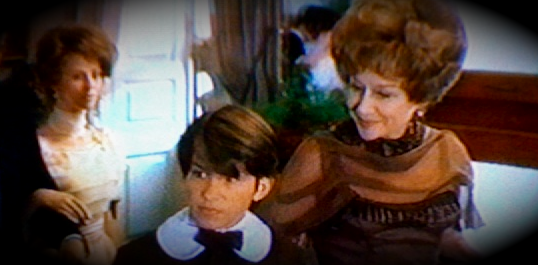 In the film, the summer's stifling heat layers atop the Maudsley's stultifying daily routines of upper class life, rituals over which Leighton's Mrs. Maudsley rules with a steely gaze and iron will.
In the film, the summer's stifling heat layers atop the Maudsley's stultifying daily routines of upper class life, rituals over which Leighton's Mrs. Maudsley rules with a steely gaze and iron will.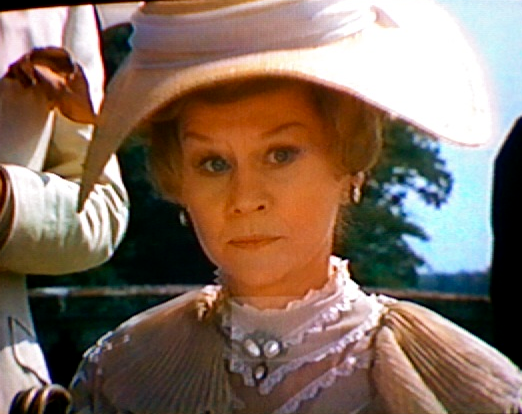 The film tells the story of Leo's loss of innocence as he becomes the intermediary in the forbidden romance between Mrs. Maudsley's daughter, Marian (a miscast Julie Christie doing a perfunctory version of her blithe beauty schtick) and a neighboring farmer (Alan Bates at the height of his craggy British hotness). Leo first worships these charismatic adults who bestow upon him their especial attention. Before long, however, Leo becomes cynical to their crass manipulations and begins to toy with the limited power they have vested in him.
The film tells the story of Leo's loss of innocence as he becomes the intermediary in the forbidden romance between Mrs. Maudsley's daughter, Marian (a miscast Julie Christie doing a perfunctory version of her blithe beauty schtick) and a neighboring farmer (Alan Bates at the height of his craggy British hotness). Leo first worships these charismatic adults who bestow upon him their especial attention. Before long, however, Leo becomes cynical to their crass manipulations and begins to toy with the limited power they have vested in him.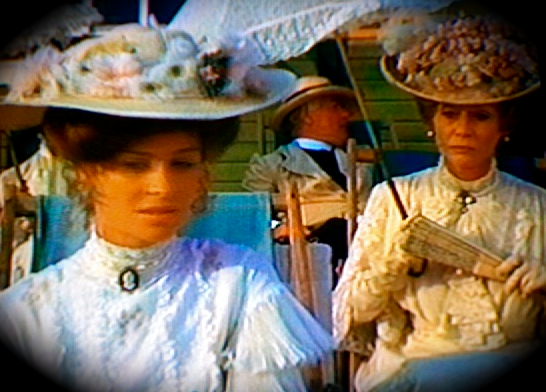 Through most of the film, Leighton's Mrs. Maudsley does most of her actressing from, literally, the edges, from the front of this procession or the back of that scene. But, as she does, her Mrs. Maudsley is ever a formidable presence, the actress's chameleonic features expressing an astonishing array of interior emotions.
Through most of the film, Leighton's Mrs. Maudsley does most of her actressing from, literally, the edges, from the front of this procession or the back of that scene. But, as she does, her Mrs. Maudsley is ever a formidable presence, the actress's chameleonic features expressing an astonishing array of interior emotions.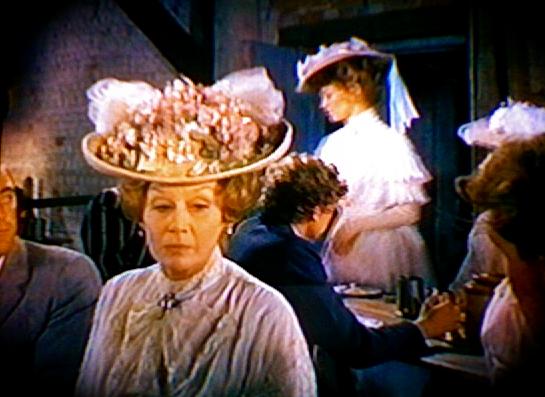 Indeed, most of the time, Leighton's Mrs. Maudsley feels more like a casino pit boss than an aristocratic lady of leisure. Her presence is one of surveillance, watching everyone and everything with exacting scrutiny. It's not that Mrs. Maudsley seems to care all that much for her family -- indeed, she regards some with unapologetic disdain -- but that Leighton's Mrs. Maudsley wishes to maintain the respectability and tradition of her family, her class, in an era of social transformation and upheaval.
Indeed, most of the time, Leighton's Mrs. Maudsley feels more like a casino pit boss than an aristocratic lady of leisure. Her presence is one of surveillance, watching everyone and everything with exacting scrutiny. It's not that Mrs. Maudsley seems to care all that much for her family -- indeed, she regards some with unapologetic disdain -- but that Leighton's Mrs. Maudsley wishes to maintain the respectability and tradition of her family, her class, in an era of social transformation and upheaval.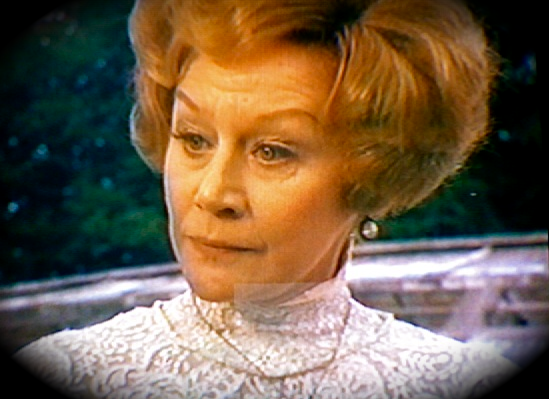 Leighton's glancing presence in these early scenes subtly conveys the fact that her Mrs. Maudsley clearly takes no pleasure in her social supervisory tasks. Leighton maximizes the clipped, oblique language of Pinter's screenplay to convey Mrs. Maudsley's grim determination in enforcing the social order. It's a thankless job, but Leighton's Mrs. Maudsley knows it's her job to do.
Leighton's glancing presence in these early scenes subtly conveys the fact that her Mrs. Maudsley clearly takes no pleasure in her social supervisory tasks. Leighton maximizes the clipped, oblique language of Pinter's screenplay to convey Mrs. Maudsley's grim determination in enforcing the social order. It's a thankless job, but Leighton's Mrs. Maudsley knows it's her job to do.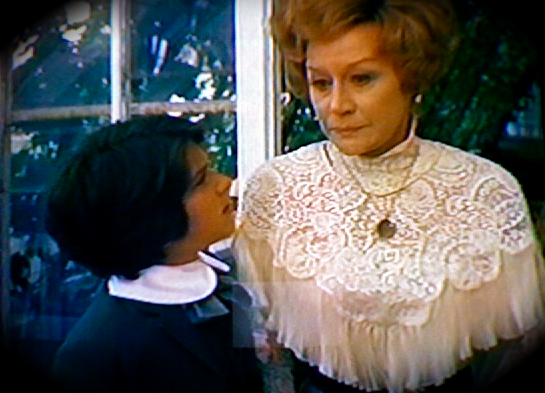 This grim, determined, measured, oblique self-control calibrates the tension in Leighton's performance, quietly preparing us for the seismic cataclysm wrought when Leighton's Lady Maudsley erupts with rage in the film's final act.
This grim, determined, measured, oblique self-control calibrates the tension in Leighton's performance, quietly preparing us for the seismic cataclysm wrought when Leighton's Lady Maudsley erupts with rage in the film's final act.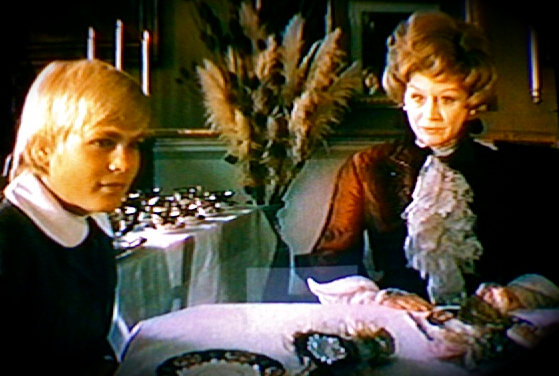 When Lady Maudsley uses the occasion of Leo's thirteenth birthday party to confirm her suspicions, two things become clear. First, that Leighton's Mrs. Maudsley has known all along that Marian was up to this particular something and, second, that Mrs. Maudsley is willing to sacrifice the boy, the farmer, her daughter and even her own pride to protect and preserve Britain's social order. Her husband and future son-in-law might lead battles throughout the crumbling British empire, but Lady Maudsley is the most formidable general on this homefront. (And you don't want to get in her way when she's on assault...)
When Lady Maudsley uses the occasion of Leo's thirteenth birthday party to confirm her suspicions, two things become clear. First, that Leighton's Mrs. Maudsley has known all along that Marian was up to this particular something and, second, that Mrs. Maudsley is willing to sacrifice the boy, the farmer, her daughter and even her own pride to protect and preserve Britain's social order. Her husband and future son-in-law might lead battles throughout the crumbling British empire, but Lady Maudsley is the most formidable general on this homefront. (And you don't want to get in her way when she's on assault...)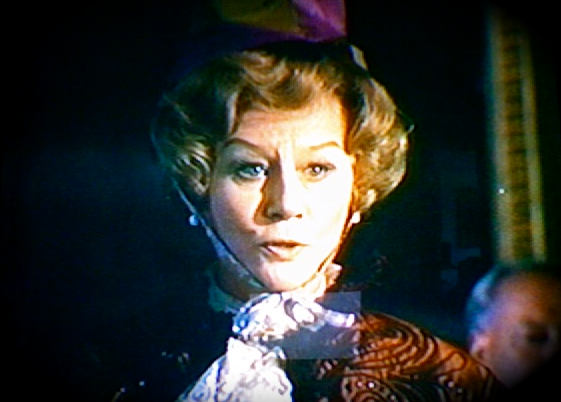 Leighton's entire performance builds toward the plot's revelatory confrontation. Each flaring glance, each stifled gasp, is as scaffolding for this discovery -- the architecture for the character's concentrated climactic sequence of scenes. No wasted effort, no lapse in purpose -- Leighton's every gesture in service toward the display of Mrs. Maudsley's genteel rage (and devastating discovery) in her final scenes.
Leighton's entire performance builds toward the plot's revelatory confrontation. Each flaring glance, each stifled gasp, is as scaffolding for this discovery -- the architecture for the character's concentrated climactic sequence of scenes. No wasted effort, no lapse in purpose -- Leighton's every gesture in service toward the display of Mrs. Maudsley's genteel rage (and devastating discovery) in her final scenes.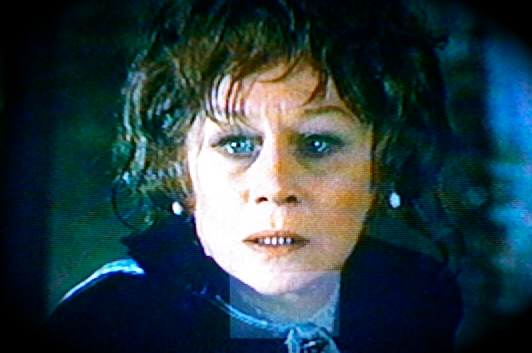 The film's brief denouement, from which the character of Mrs. Maudsley is entirely absent, illuminates just how instrumental Margaret Leighton's performance is to the film. You know that dull buzz of nearly intolerable anxiety that permeates this whole film? Well that's all the doing of Leighton's Mrs. Maudsley; she's the one that's been stoking the tension that impels the action of the entire film.
The film's brief denouement, from which the character of Mrs. Maudsley is entirely absent, illuminates just how instrumental Margaret Leighton's performance is to the film. You know that dull buzz of nearly intolerable anxiety that permeates this whole film? Well that's all the doing of Leighton's Mrs. Maudsley; she's the one that's been stoking the tension that impels the action of the entire film.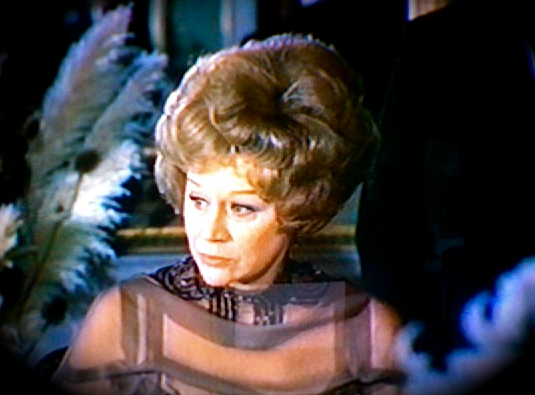 Leighton's incredibly potent performance is an elegant, understated example of just how much work some actresses accomplish at the edges...
Leighton's incredibly potent performance is an elegant, understated example of just how much work some actresses accomplish at the edges...



2 comments:
Enjoyed reading about two performances I may never see. Even though I love Harris, I don't think I'd be too wild about Harry; however, Leighton in The Go-Between is something else.
So is that picture of a bedraggled Leighton- it's so mouth-wateringly dramatic I don't even care I lack knowledge regarding the basis for her character's unkempt state. The "wet look" suits Leighton- she looks fabulous, in the best "actressexual" sense (if she can emote like this in a single screen shot, she must truly be awesome in the film).
I like how the awards groups spread the wealth for 1971- Leighton took home the British Academy Award, Leachman and Burstyn both snagged two awards, and Ann-Margret won one of her many Golden Globes. Only poor Barbara was left out in the rain, and I don't think that I can take it (at least she already had a Tony on her mantle, though, with a well-deserved Smackdown Award for Nashville looming in her future).
Love this woman
Post a Comment